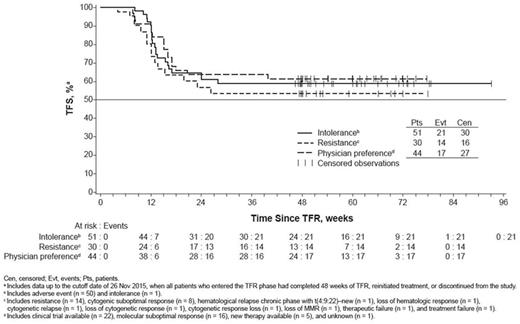Abstract

Background: ENESTop, an ongoing, single-arm, phase 2 study (ClinicalTrials.gov, NCT01698905), is the first trial specifically evaluating treatment-free remission (TFR; ie, stopping tyrosine kinase inhibitor [TKI] treatment without a loss of response) in patients with chronic myeloid leukemia in chronic phase (CML-CP) who achieved a sustained deep molecular response after switching from imatinib (IM) to nilotinib (NIL). Of 126 patients in ENESTop who were eligible to stop NIL, 57.9% (95% CI, 48.8%-66.7%) maintained TFR at 48 weeks. Here we present results from a subgroup analysis based on reasons for switching from IM to NIL, categorized as intolerance, resistance, and physician preference.
Methods:Eligible patients were adults with CML-CP who received ≥ 3 years of total TKI therapy (> 4 weeks of IM, followed by ≥ 2 years of NIL) and achieved a sustained MR4.5 (BCR-ABL1 ≤ 0.0032% on the International Scale [BCR-ABL1IS]) on NIL therapy; patients with a documented MR4.5 at the time of switch from IM to NIL were not eligible. Enrolled patients continued NIL treatment in a 1-year consolidation phase, and those without confirmed loss of MR4.5 (ie, consecutive BCR-ABL1IS > 0.0032%) were eligible to stop NIL in the TFR phase. Patients with loss of major molecular response (MMR; ie, BCR-ABL1IS > 0.1%) or confirmed loss of MR4 (ie, consecutive BCR-ABL1IS > 0.01%) during the TFR phase reinitiated NIL treatment. The primary endpoint was the proportion of patients who maintained TFR (ie, no loss of MMR, confirmed loss of MR4, or treatment reinitiation) at 48 weeks after stopping NIL.
In this post hoc analysis, rates of TFR at 48 weeks after stopping NIL and a Kaplan-Meier (KM) analysis of treatment-free survival (TFS; defined as the time from the start of TFR to the earliest occurrence of any of the following: loss of MMR, confirmed loss of MR4, reinitiation of NIL due to any cause, progression to accelerated phase/blast crisis, death due to any cause) were evaluated in subgroups of patients who switched from IM to NIL due to intolerance, resistance, or physician preference. These categories were determined by grouping the reasons for switching from IM to NIL, as reported by the investigators, based on relatedness to safety (intolerance), loss of response/treatment failure (resistance), and the physician's clinical judgment (physician preference); individual reasons included within each category are presented in the Figure.
Results:A total of 125 patients who entered the TFR phase were included in this analysis; 1 patient who was found to have had atypical transcripts was excluded. Among these 125 patients, the reasons for switching to NIL were categorized as intolerance in 51 patients (40.8%), resistance in 30 patients (24.0%), and physician preference in 44 patients (35.2%). The proportion of patients who maintained TFR at 48 weeks after stopping NIL was generally similar across the 3 subgroups: 30 of 51 (58.8%; 95% CI, 44.2%-72.4%) in the intolerance subgroup, 16 of 30 (53.3%; 95% CI, 34.3%-71.7%) in the resistance subgroup, and 27 of 44 (61.4%; 95% CI, 45.5%-75.6%) in the physician preference subgroup. KM analysis of TFS showed that in all 3 subgroups, the majority of TFS events occurred within the first 24 weeks after stopping NIL (Figure). There were no notable differences in the kinetics of TFS events among subgroups. The KM-estimated median duration of TFS was not reached by the data cutoff date in all 3 subgroups.
Conclusion: Primary analysis from ENESTop showed that among patients with CML-CP who achieved a sustained MR4.5after switching from IM to NIL, 57.9% of those who stopped NIL maintained TFR at 48 weeks. In the present analysis, TFR was maintained at 48 weeks after stopping NIL by > 50% of patients in the intolerance, resistance, and physician preference subgroups, with generally similar results across subgroups. These findings suggest that the rate of successful TFR following second-line NIL does not differ based on the reasons for switching from IM to NIL.
Hughes:Ariad: Honoraria, Membership on an entity's Board of Directors or advisory committees, Research Funding; BMS: Honoraria, Membership on an entity's Board of Directors or advisory committees, Research Funding; Novartis: Honoraria, Membership on an entity's Board of Directors or advisory committees, Research Funding; Australasian Leukaemia and Lymphoma Group (ALLG): Other: Chair of the CML/MPN Disease Group. Boquimpani:Novartis: Research Funding, Speakers Bureau; BMS: Speakers Bureau. Takahashi:Novartis: Honoraria, Research Funding; Pfizer: Honoraria, Research Funding; BMS: Honoraria. Shuvaev:Pfizer: Honoraria; BMS: Honoraria; Novartis pharma: Honoraria. Ailawadhi:Pharmacyclics: Consultancy; Novartis: Consultancy; Amgen Inc: Consultancy; Takeda Oncology: Consultancy. Lipton:Pfizer: Consultancy, Research Funding; Novartis: Consultancy, Research Funding; BMS: Consultancy, Research Funding; Ariad: Consultancy, Research Funding. Turkina:Pfizer: Honoraria; Novartis Pharma: Honoraria; BMS: Honoraria. Moiraghi:BMS: Speakers Bureau; NOVARTIS: Speakers Bureau. Nicolini:Novartis: Honoraria, Membership on an entity's Board of Directors or advisory committees, Research Funding; BMS: Consultancy, Honoraria; Ariad pharmaceuticals: Honoraria, Membership on an entity's Board of Directors or advisory committees. Sacha:BMS: Consultancy, Honoraria, Speakers Bureau; Incyte: Consultancy, Honoraria, Speakers Bureau; Pfizer: Consultancy, Honoraria, Speakers Bureau; Novartis: Consultancy, Honoraria, Speakers Bureau; Adamed: Consultancy, Honoraria. Kim:Pfizer: Honoraria, Membership on an entity's Board of Directors or advisory committees, Research Funding, Speakers Bureau; BMS: Consultancy, Honoraria, Membership on an entity's Board of Directors or advisory committees, Research Funding, Speakers Bureau; Novartis: Consultancy, Honoraria, Research Funding, Speakers Bureau; ILYANG: Consultancy, Honoraria, Research Funding. Fellague-Chebra:Novartis: Employment. Acharya:Novartis Healthcare Pvt. Ltd.: Employment. Krunic:Novartis: Employment, Equity Ownership. Jin:Novartis: Employment, Equity Ownership. Mahon:BMS: Honoraria; PFIZER: Honoraria; NOVARTIS PHARMA: Honoraria, Research Funding; ARIAD: Honoraria.
Author notes
Asterisk with author names denotes non-ASH members.

This icon denotes a clinically relevant abstract


This feature is available to Subscribers Only
Sign In or Create an Account Close Modal